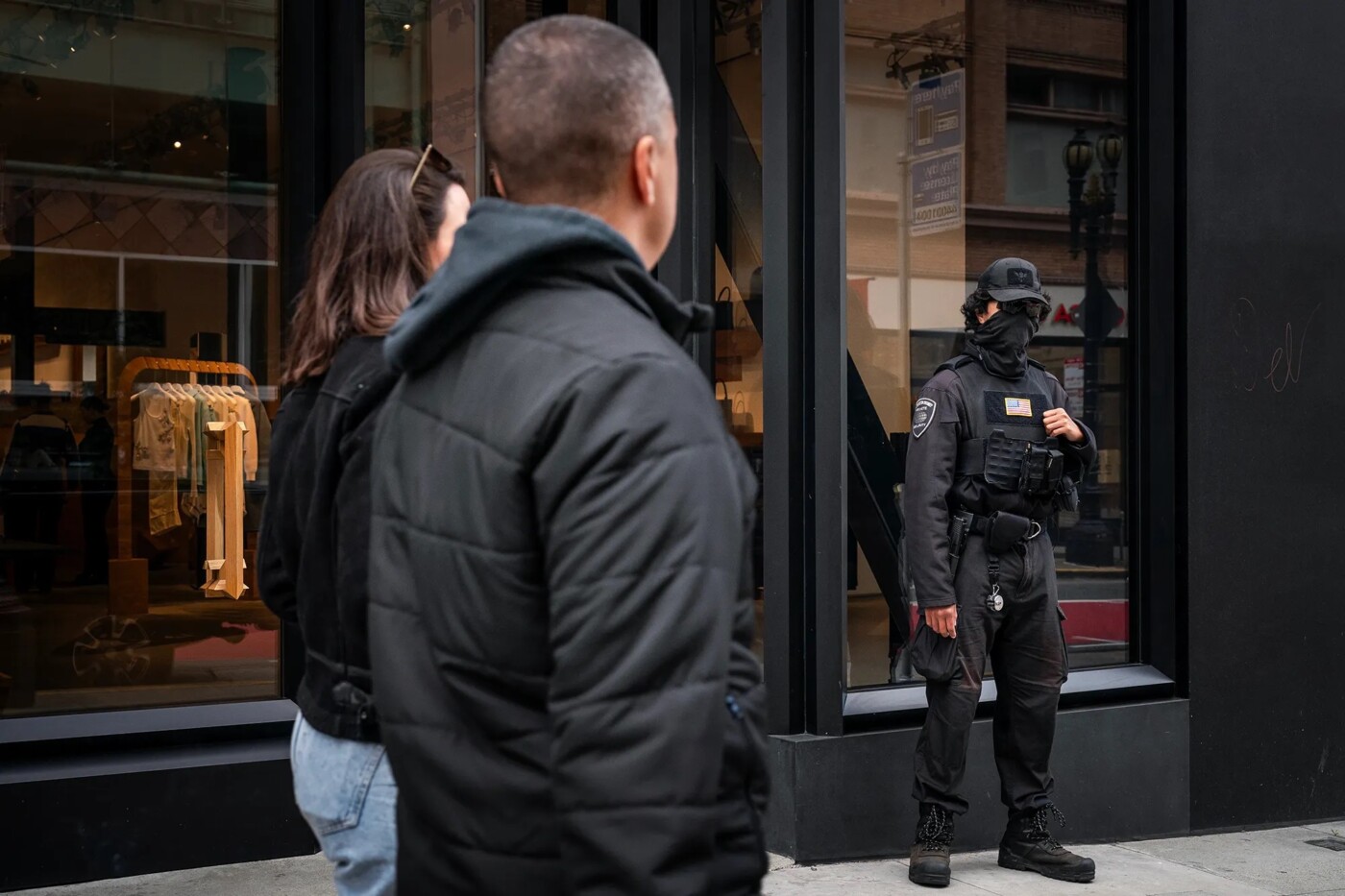The money at Colonial Donuts was gone before dawn, again. This time, so was the cash register.
Three people had walked in just before 6 a.m on March 1. One jumped over the counter and ripped out the register. Another held up a golf club. The other used the shop’s yellow “wet floor” sign to keep the front door open.
It was the fourth time in 10 months the 24-hour donut shop — a local haunt on Lakeshore Avenue in Oakland — was robbed, enough for store owner Phing Yamamoto to tell her employees: “Do not even try to risk it or question it. Whatever they ask for, just appease.”
Hits on Yamamoto’s shop — and many other retailers big and small — are fueling a growing frustration about crime in California. While violent and property crime rates have increased statewide since 2020, they remain relatively low compared to the 1980s and 1990s, according to the Public Policy Institute of California.
Recent rising crime — highlighted by tales and videos of shoplifting, robberies and “smash-and-grabs” — has reignited a policy debate among local and state elected officials, who are vowing to curtail retail crime.
Much of their focus is on whether to overhaul Proposition 47 — a voter-approved law in 2014 that lowered penalties for petty thefts and minor drug offenses.
But the proposed changes would only address a sliver of the concerns among many Californians: By primarily targeting petty crimes, they do not address robberies or other violent felonies, which some residents and business owners now confront more frequently. Without a clear answer in sight, they are considering different solutions.
Critics of Prop. 47 have long blamed it for a rise in crime, even though data on its effectiveness is far from conclusive. Statewide associations representing district attorneys, police chiefs and sheriffs — as well as mayors in San Francisco and San Jose — are backing a proposed ballot measure to roll back Prop. 47. Last week, the anti-Prop 47 campaign turned in 900,000 signatures, making it likely the measure will qualify for the November ballot.
Meanwhile, California’s top Democrats, reluctant to change Prop. 47, are instead pushing legislation that would create new crimes and toughen penalties for organized retail theft and repeat offenders. Attorney General Rob Bonta told reporters earlier this month the legislation is necessary even though data on retail theft is mixed.
“We have seen with our own eyes and our own lived experiences the unacceptable, brazen, bold organized retail crimes,” he said. “We can’t have flash mobs going into a store and stealing.”
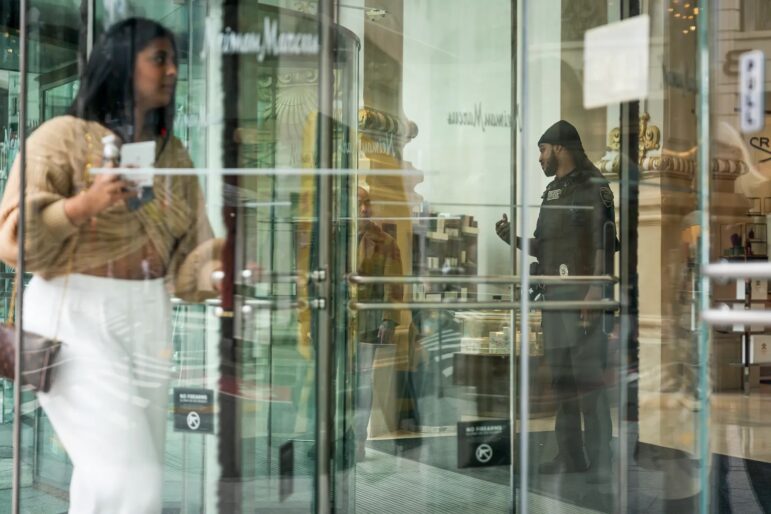
Those bills put legislative leaders at odds with more progressive Democrats, who argue that rehabilitation programs, not incarceration, are the solution to crime. Putting more people behind bars could send the state back to the 1980s and 1990s, when the prison population swelled so much that the California Supreme Court ordered the state to reduce it, they said. They also point to studies showing that the likelihood of getting caught, instead of the severity of punishment, is what deters people from crime.
Yamamoto, however, has not heard of Prop. 47. Nor has she followed the debate in Sacramento. The repeated robberies forced her to step up security: more lights in the store, locked gates in the back, and a service window open when employees feel unsafe at night, even though that meant less business.
What could policymakers do to help?
“I don’t know what the answer is,” Yamamoto said. “But something’s got to change. We can’t continue on this road.”
‘Infuriated and feeling defeated’
Donuts are Yamamoto’s family business. Her parents, both Chinese immigrants, bought the donut shop in the 1980s. It now has two locations — one on Lakeshore Avenue and another in the Montclair neighborhood.
In 2017, Yamamoto left a full-time job with Apple to take over the donut shop, where she started working when she was 9. “It’s second nature to me,” she said.
Being open 24 hours is a big selling point: When the Raiders and the Warriors still played in Oakland, the donut shop was bustling after night games. “Most of the fans would come out like, ‘Hey, what’s open?’ We are open,” she said.
But nighttime business isn’t what it used to be. And over the years, families Yamamoto knows have left the city for better schools or “somewhere that is safer,” she said. Some fast food chains — such as Denny’s and In-N-Out Burger — have closed stores this year in Oakland, citing crime concerns.
In Oakland, violent crime has climbed since 2018, although it’s nowhere near where it was in 1992, when the city recorded more than 10,000 cases, according to the California Department of Justice. Over the past decade, the number of reported property crimes was mostly trending downward, but after a dip during the pandemic in 2020, the number of cases steadily increased, with the biggest spike in auto thefts, data shows.
Last year, violent crime in Oakland spiked by 21%, city data shows. Robberies jumped by 38% and car thefts, 45%. In response, Gov. Gavin Newsom sent 120 California Highway Patrol officers to Oakland and the East Bay in February. Earlier this month, the agency reported making 181 arrests and recovering 414 stolen vehicles and 31 “crime-linked firearms,” the governor’s office said.
Last June, three men robbed Yamamoto’s shop. One man dragged the cashier across the bakery, pointed a gun at him and forced him to open the cash register. Six months later, the shop was robbed twice in the same week. One of the robbers grabbed a donut on the way out, Yamamoto said.
She said she never filed an insurance claim for the losses, worried it would hike her premiums. On top of the robberies, her delivery van was stolen, and someone attempted to steal her backup van, she said. The incidents scared workers, and Yamamoto is worried she won’t be able to retain staff in the future.
“(My dad) has never been more infuriated and feeling defeated at the same time,” Yamamoto said. “He’s like, ‘I work so hard, I come to this country, I own a business, and then this is what happens.’”
Why not just leave Oakland?
That would be the easy way out, Yamamoto said.
“We are such a dynamic city, and vibrant, and I want us to be in a better light,” she said. “This is a community that I want to be a part of, and I kind of want to just see it through.”
‘Every theft impacts us’
Across the Bay in San Francisco, Anthony Bernardo has been lucky. His customers tell tales of apartment break-ins. He sees people getting arrested around the corner “every other day,” he said. A liquor store down the street had been robbed a few days ago, and the employee was too terrified to speak to a CalMatters reporter.
Bernardo works at the Magic Flower Cannabis Dispensary, across the street from one of San Francisco’s busiest fire stations, in the Tenderloin District. Fire trucks whoosh by every 45 minutes or so, Bernardo said. And as if on cue, one of them raced by, the blaring sirens drowning out Bernardo as he spoke.
While the store hasn’t been robbed in the seven months Bernardo had worked there, he said his car had been broken into. The only thing missing was his lunch (chicken teriyaki), he said: “Maybe they needed the food more than me.”
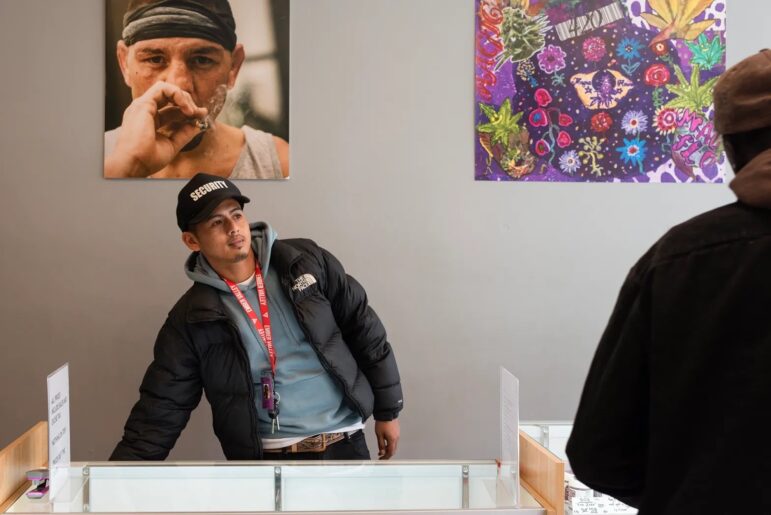
From robberies to car thefts, crime is falling in the city this year, according to a San Francisco Standard analysis of police data this spring.
But Bernardo, a city native, said crime is receiving more attention now because word travels fast through social media. In March, San Francisco voters approved two ballot measures to subject welfare recipients to drug screening and loosening restrictions on police chases and surveillance. On Tuesday, Mayor London Breed proposed an ordinance that would require a curfew among some Tenderloin District businesses between 12 a.m. and 5 a.m.
But Bernardo is skeptical that any new laws would fix much, especially if they are not followed up.
“You don’t really see no change,” he said. “I think it has a lot to do with election years and just trying to win over voter appeal.”
For Bernardo, the solution to petty crime is more rehabilitation centers.
“Because after you get out of jail downtown, you walk right back up the street, you are in the mix of everything again,” he said, pointing in the jail’s direction. “It’s like a never-ending cycle.”
He also said that retailers should hire those who were formerly incarcerated. “It’s tough dealing with all the losses that you take as a business, but then at the same time, people are out there hungry, and they don’t have jobs and they don’t have money,” he said.
Ten minutes east of Bernardo’s business is Postscript, a gift shop a block away from the pyramid-shaped Transamerica skyscraper. After two shopliftings within the same week, shop owner Chandler Tang posted the security camera footage on TikTok, voicing her frustration. Videos showed two well-dressed women quietly picking up items and stuffing them in the bag or underneath the coat.
“We are a small business, so every theft impacts us,” Tang said on the TikTok video.
The women looked like they “come from means,” but still stole gifts, she said. “While I don’t support stealing, there’s something a bit different when someone might not be able to afford to eat or afford baby formula to feed their children,” she said.
Now, Tang only displays a set amount of merchandise, so it’s easier for staff to spot missing items. She added cameras and plans to have a video stream customers can see when they shop. She has put up “Smile, you are on camera” signs but wants to add a fun twist: “Make it like a selfie moment.”
Changing Prop. 47 isn’t top of mind for Tang, either. While she agrees the threshold for charging petty thefts as felonies should be reduced from $950 to $400, Tang wondered how a small gift shop like hers would ever reach that threshold.
What would help: Better networks where business owners share tips and tools to prevent shoplifting, or grants for small businesses to offset the cost of stolen goods, Tang said.
“I feel like we have to be the ones to take in our hands for something to actually be done,” she said.
‘Facing the consequences’
But some of those directly affected by more violent crimes have a different perspective.
“People may not understand the impact of crime unless you became the victims yourself,” said Carl Chan, president of the Oakland Chinatown Chamber of Commerce. While Chan and the chamber support rehabilitation programs helping formerly incarcerated people, he argued prison sentences are a necessary penalty and deterrent.
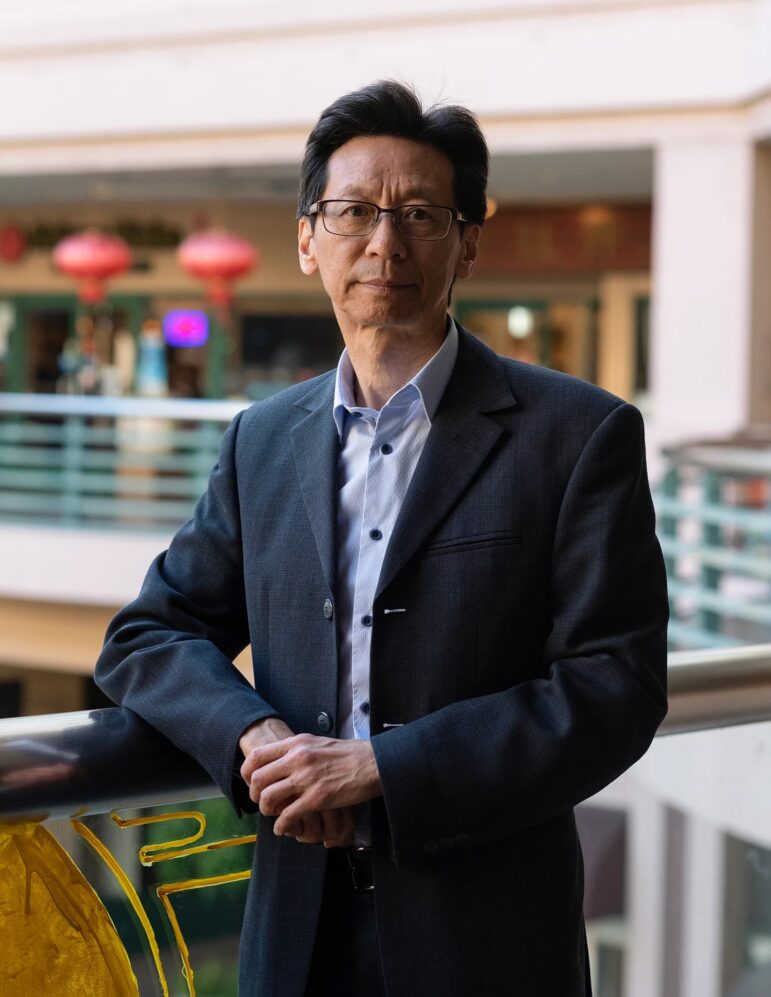
In 2021, Chan was punched in the back of the head by James Ramsey, who was on parole and was arrested the same day. Chan said his attacker shouted an anti-Asian slur. In February 2022, Ramsey was sentenced to 18 months in jail, according to The Mercury News.
Ramsey was homeless and diagnosed with bipolar disorder and schizophrenia when the attack occurred. A GoFundMe page raised $12,000 in 2022 for his treatment, food, clothes, and housing. But last year, Ramsey was arrested again for assaulting an 88-year-old Asian woman in San Francisco. Chan argued that the incident sends a message that crime was “financially rewarded.”
“There are certain people that will not change. They should not be out,” he said.
Chan is applying the same philosophy to retail crimes. While he’s a critic of Prop. 47, Chan argued that enforcement under existing law is a problem. Eventually, more police presence would help prevent crimes from being committed in the first place, he said.
In Oakland, the number of funded sworn police officers held steady between 1991 and 2022 at about 710, according to data from the California Department of Justice. As of October, the department had 909 officers, with another 67 positions unfilled, according to a city staffing report last year.
Chan also blamed Alameda County District Attorney Pamela Price, a progressive Democrat, for seeking lower sentences and dismissing cases, so much so that some prosecutors in her office quit their jobs. Price and her supporters have stood by her restorative justice approach to crime, even though her office has not released data on her charging record, the San Francisco Chronicle reported.
Chan is leading the charge to recall Price from office, arguing a lack of penalties emboldened offenders to repeatedly commit crimes. “I think the law is supposed to protect the people and the victims,” he said. “But I think we are seeing the reverse. We are seeing the law actually protecting the criminals more.”
Karina Velásquez, an immigration lawyer and president of the anti-crime group Stop Crime San Francisco, agreed. A Venezuela native, she said she represents undocumented immigrants who are victims of violent crimes.
The group has volunteers watching court proceedings and grades judges on their sentencing. It has taken aim at progressive judges and mayoral candidates while supporting those tougher on sentencing, though the group’s critics say that judges should not cave to political pressure.
Velásquez — who deems herself a moderate Democrat — said that incarceration can deter crime and that repeated offenders must also face harsher penalties. “If you commit a crime, the moral responsibility is to face the consequences,” she said.
For Greg Carey, chairperson of the self-organized neighborhood group Castro Community on Patrol, what’s important is not necessarily passing new laws, but enforcing those already in place and “make that as effective as we can.”
The group was born in 2006 out of street robberies and date rapes in San Francisco’s Castro neighborhood, Carey said. Volunteers conduct street patrols in the historic LGBTQ district — sometimes a target of hate crimes — to deter crime and sometimes serve as witnesses, he said.
Carey, a self-described conservative Democrat, contended that social media posts about smash-and-grabs in San Francisco are part of ultra-right propaganda. “Every four years, you will see that ramped up. And at least in recent history, San Francisco has always been the worst example to put in front of middle class America as to what we don’t want,” he said.
The key, Carey said, is still for businesses to report crime to law enforcement.
But Manny Yekutiel, owner of event venue Manny’s in San Francisco’s Mission District, said there’s no silver bullet. He said his business was burglarized within a few years of opening in late 2018. Police woke him up at 3 a.m. and sped to the crime scene with him in the car after the thieves had stolen his safe and video cameras, he said.
“The status quo is not working,” Yekutiel said, and “the word on the street” is that people can get away with stealing less than $950 worth of goods without severe penalty.
Yekutiel said he wants to see more foot patrols. And while he said thefts should not mean long-term prison sentences, incarceration should be a deterrent.
“It should be something that tries to make people think twice about committing these crimes,” he said. “I think what’s really important is once you’ve served your time you should be given every opportunity to change your life.”
‘Why are we married to incarceration?’
One of those opportunities turned Julia Arroyo’s life around.
At age 15, Arroyo said, she was arrested for stealing clothes and spent 90 days in jail. She had been in foster care since she was 4 and went in and out of jail until she turned 18. “I became very good at just doing my time,” she said.
“As a young person, I needed a hug. I needed love,” she added. “But instead, I was placed in places where I was not safe.”
After aging out of foster care, Arroyo said she got her first job at a nail shop passing out hot towels, sweeping up toenails and doing airbrush tanning. With the money she made, Arroyo signed her first apartment lease. But Arroyo said the landlord raised the rent beyond what she could afford, and she was evicted.
Arroyo began staying at a shelter with a shared bathroom down the hall. There, she was propositioned for sex all the time, she said. She had a daughter in her early 20s, while she was homeless. To raise her, Arroyo stood in line for a bed at shelters, where her property was sometimes stolen. She worked three jobs cleaning homes, caring for seniors and working at a rape crisis center, to feed her daughter, she said.
Connecting with the Young Women’s Freedom Center — an advocacy group guiding women and transgender youths through the legal and foster care systems — gave Arroyo a job helping others in similar situations.
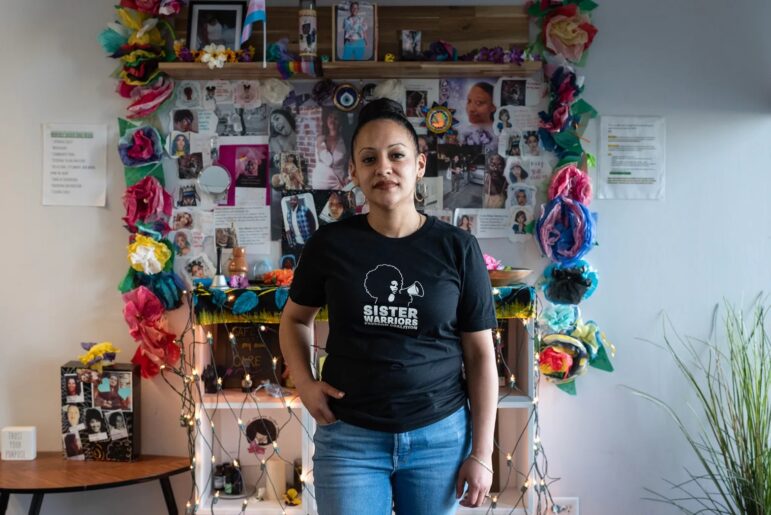
Arroyo argued that incarceration perpetuates a “punishment culture” that disproportionately affects Black and brown communities, especially if they are released from prison without basic skills to survive.
“Everytime you get out, you have to start from square one,” she said.
Data from the San Francisco Public Defender’s Office shows that of the 47 people it has represented who were charged with organized retail theft since the Legislature created the crime in 2019, 38 were Black. That’s 80%, even though Black people account for just 5% of the city population.
The office is opposing proposed legislation that would toughen penalties on retail crime.
Liz Camacho, a public defender since 2011, said the increase in retail theft is “an indictment on our own economy and how we have not been able to really help our community recover from COVID.”
While the push for tougher laws could win votes, Camacho argued the move could have lingering ripple effects for those who steal out of desperation.
“A law that further criminalizes the poor does not create more choices. It creates more restriction, more inability to get yourself out of that rut, to pull yourself up from the bootstraps,” she said.
Camacho said the state should invest in workforce development, counseling services and expungement programs to help people rehabilitate.
“Why are we married to incarceration?” she asked.
In Oakland, donut shop owner Yamamoto pondered the solutions. Could more surveillance cameras on the street help catch every culprit? And would rehabilitation programs help everyone back on their feet?
“It’s a tough question,” she said.
